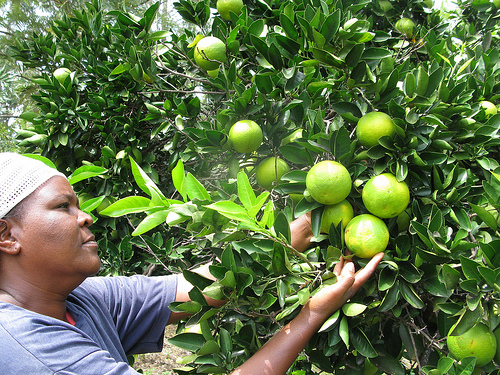By Isaiah Esipisu
RIO DE JANEIRO, Jun 19 (TerraViva) Giving farmers an opportunity to own plots can turn around under-utilised land and make it highly productive, according to a senior agro-forestry expert at the ongoing United Nations’ negotiations on sustainable development.

Kenyan farmer Judith Mwikali Musau has successfully introduced the use of grafted plants for crop and fruit harvesting. Credit: Isaiah Esipisu/IPS
In a side event organised by the government of Japan at the Rio+20 conference in Brazil to review the Satoyama Initiative, Prof. Tony Simons, director general of the World Agroforestry Centre (ICRAF) told delegates that land ownership was an important missing link for fostering the desired green economy.
The Satoyama Initiative was launched jointly in 2010 by Japan’s Ministry of Environment and the United Nations University Institute of Advanced Studies (UNU-IAS) in partnership with the World Agroforestry Centre (ICRAF). Its goal was to build the relationship between human beings and nature by promoting reclamation of natural resources to change landscapes.
“Studies have shown that people with total land ownership can easily engage in sustainable farming and agroforestry, hence conserving biodiversity and other natural resources, (more) than those who are leasing it for a short period of time,” Simons said.
He cited a survey conducted by ICRAF in Kenya, where satellite images of adjudicated land and un-adjudicated land were analysed to compare the nature of investments within areas with land tenure and those without.
The 2011 survey analysed 22,000 images from different parts of the country that are viable for agricultural production.
“The findings of the study showed enormous differences between the two landscapes. Where there was land tenure, there were (more) massive investments on the ground than in places without land tenure. This means that the future green landscape lies in areas where people have land tenure,” he said.
The green economy has been held out as way to keep young people in the countryside, thus generating employment and at the same time decongesting cities.
Environmental experts at the forum observed that through sustainable use of biological resources, farmers can easily sustain biodiversity – which also promotes green economy objectives.
“This will therefore facilitate indigenous people to enjoy a stable supply of various natural benefits and as well be sure of a sustainable green future,” said the ICRAF chief.
In many parts of Africa, land is owned by communities, a fact that some research shows has a detrimental impact on the green economy.
“Legislators must put in place appropriate policies to enable individuals to own land if we have to achieve the desired green economy, and suitable landscapes,” said Simons.
Kazuki Hoshindo, advisor to the Japanese minister for environment, said that another option is to employ a strategy of public-private partnerships, to work closely with the indigenous communities.
“In Japan, for example, the private sector activities towards a green economy have been expanding, thus making very good progress. The private sector has a promising potential in technology, marketing, cost consciousness and social responsibility,” he told scientists at the Rio+20 forum.







 Add to Google
Add to Google







